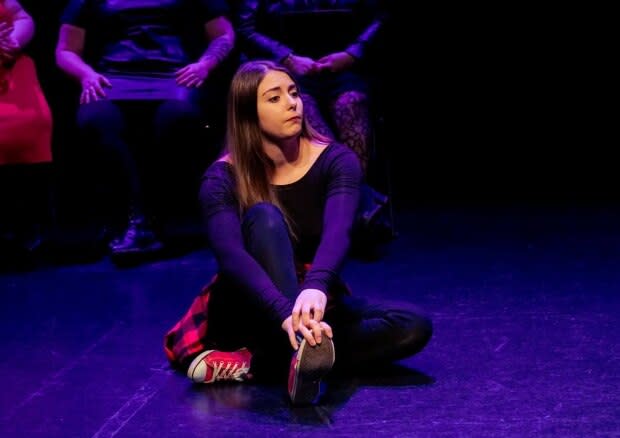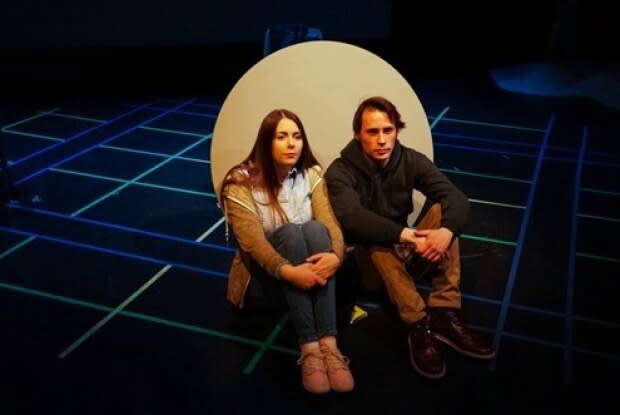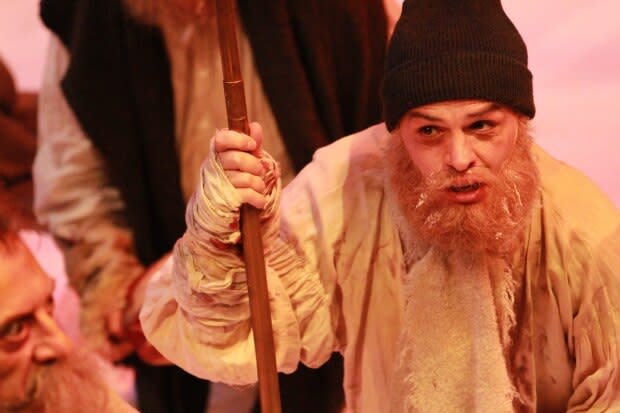Indigenous theatre actors, underrepresented on stage, detail their experiences
Indigenous cultures across the country have a strong storytelling heritage, yet they continue to be underrepresented in mainstream Canadian theatre, as two theatre artists from Newfoundland and Labrador detail their experiences and struggles in the sector.
"The theatre scene is a predominantly white scene," said Gordon White, an award-winning Mi'kmaw theatre artist who grew up in Flat Bay, N.L.
White fell in love with theatre in high school and pursued it at Grenfell Campus's theatre program in Corner Brook before entering the professional sphere. In the years since, he's performed for some of the biggest theatre companies in the country, and now works for one of its premiere institutions, the Stratford Festival.
White said the theatre world can be a daunting place for anyone, with its lack of financial security and constant criticism. Those problems are compounded for people from poorer backgrounds or who face other challenges growing up, and don't see their worlds reflected back to them.
"When you don't see … Indigenous peoples of colour represented, it doesn't have much appeal for anyone who is Indigenous to try and pursue it," he said.
As a white-passing Indigenous theatre artist, Elizabeth Hicks said she has observed, first-hand, the racism toward Indigenous peoples in Newfoundland and Labrador her entire life. Growing up in Carbonear as a child of European and Mi'kmaw heritage, she said she heard unsavoury and racist remarks and stereotypes.
"Those types of attitudes are actually [why I think] a lot of people in Newfoundland and Labrador don't want to identify as Indigenous," said Hicks, on the low numbers of Indigenous artists on and off stage in the province's theatre scene.

Parts and pigeonholes
Due to her mixed heritage, Hicks said, her skin colour has given her the privilege of being less likely to be pigeonholed into certain roles, a familiar experience for White.
"It's funny sometimes to see some people who refuse to believe that somebody like me with long hair can be in the show," White said.
"The entire system has been built to reflect white ideas or a white consideration. It has to be reworked and reconsidered to find somebody like me in a European play, even though historically somebody like me might have been in such a story."
Hicks has played a variety of Indigenous and non-Indigenous parts. Her time performing an Indigenous character in Megan Gail Coles's play Squawk, left an indelible impression — for better and worse.
Diversity and representation, I think, is something that's on the forefront of most people's minds in the theatre community. - Elizabeth Hicks
One of the positive experiences that has stayed close to her heart was when a young girl walked up to Hicks post-show, expressing her gratitude to see herself and a relatable story reflected on stage.
On the flip side, due to the colour of her skin, Hicks often encountered the question "What kind are you?" as people asked about her part in the play.
"Of course people wanted to talk about it and I wanted to talk about it too. [But] when it's sprung as something like, 'what kind are you,' like you're a type of item on a shelf, it's … just a little unpleasant," said Hicks.
For Hicks, the theatre community in Newfoundland and Labrador has been welcoming, and one where she found a community and people with mixed heritage, like herself, that she could connect with.
But she still has questions.
"If we pride ourselves on telling stories of this province, then why aren't we seeing [them]?" she said.
The 'Recolonizer 2000'
White connects this lack of representation to the systemic dominance of white culture, which in some cases has been enshrined in legislation.
The federal Indian Act of 1876 barred Indigenous peoples' rights to cultural and spiritual ceremonies, gatherings and artistic expression, making them, in some cases, punishable by death.

Seventy-five years later, in 1951, the final report from the Royal Commission on the Arts, a federal government-mandated investigation into the state of the sector in Canada, stated "the impact of the white man with his more advanced civilization and his infinitely superior techniques has resulted in the gradual destruction of the Indian way of life. The report said Indigenous arts were "ghosts or shadows of a dead society" that "could never regain real form or substance."
Those words and thoughts have reverberated, and shown up in White's life, as he merged his Indigenous culture with the theatre world through smudging, a ceremony he has taken with him to many theatre companies.
At Stratford, White said, as per fire regulations, he was followed by an air purifier that would be turned on after he finished smudging.
"I would constantly refer to the device as a 'Recolonizer 2000' [that would] take out all of the Indigenous, the smell from the room and then we'll be OK," said White.
Stepping up
Much like the larger Canadian scene, theatre companies in Newfoundland and Labrador are stepping up to consciously engage with Indigeniety.
Companies such as Artistic Fraud and White Rooster Theatre have made conscious efforts to engage with artists of colour or bring Indigenous theatre from different parts of Canada to a local audience. Recently, using its own money, Persistence Theatre announced a paid production internship for individuals identifying as Indigenous.
"Diversity and representation, I think, is something that's on the forefront of most people's minds in the theatre community. It's something that we're all striving for. But of course we can certainly do better," said Hicks.

Despite White's decades in the industry, there still is a nagging voice in his head telling him that, as a Mi'kmaw Newfoundlander, he may never find belonging in the world of theatre.
"The things that silence that voice [are] the individuals that I've met … who have mentored me … that makes me go, 'No, we do belong. I can belong,'" he said.
"That's the thing I cling to, to keep me going because it's not always there. But it's those strong voices that go, 'No, you can. You are enough,'" said White.
Read more from CBC Newfoundland and Labrador


